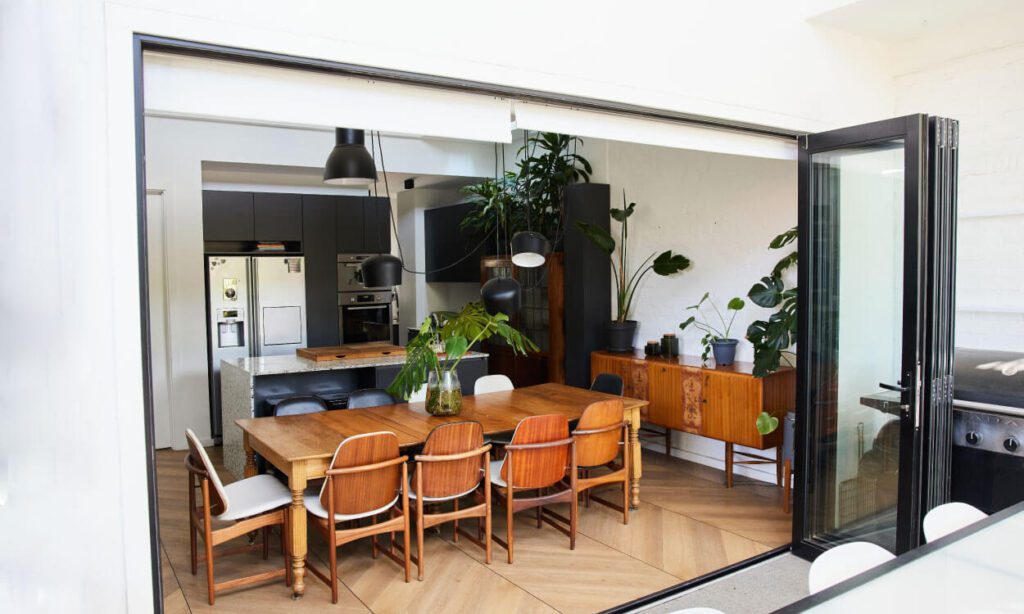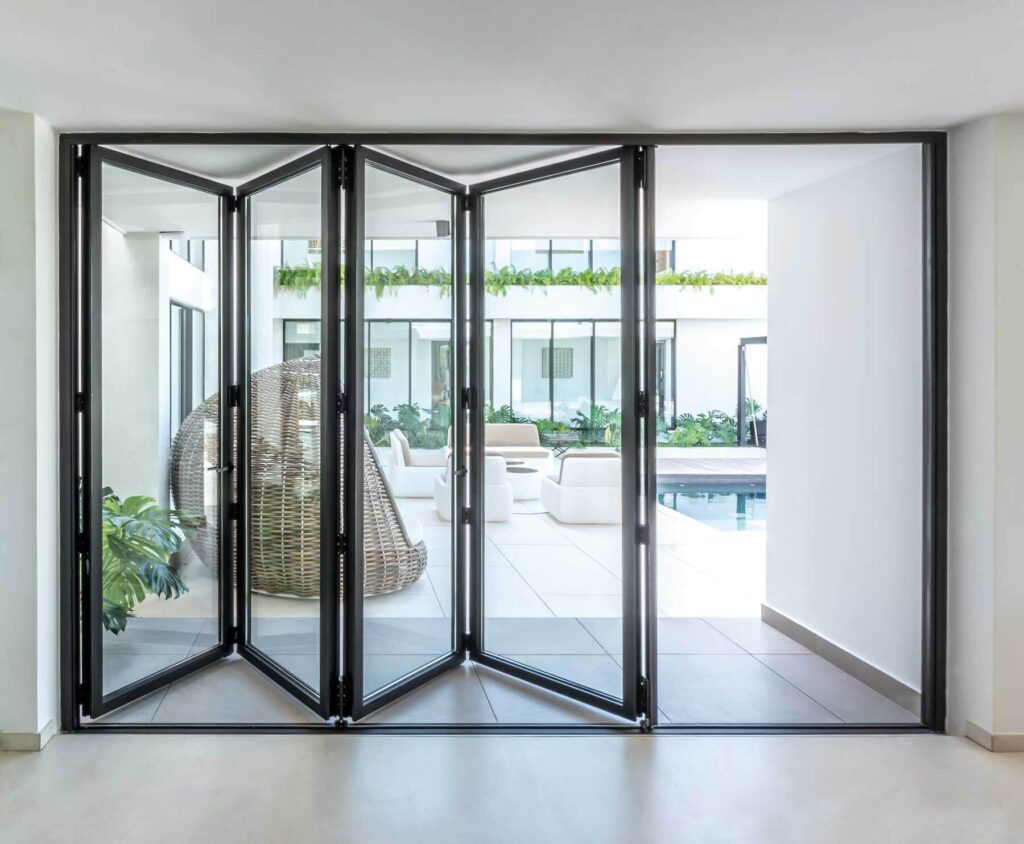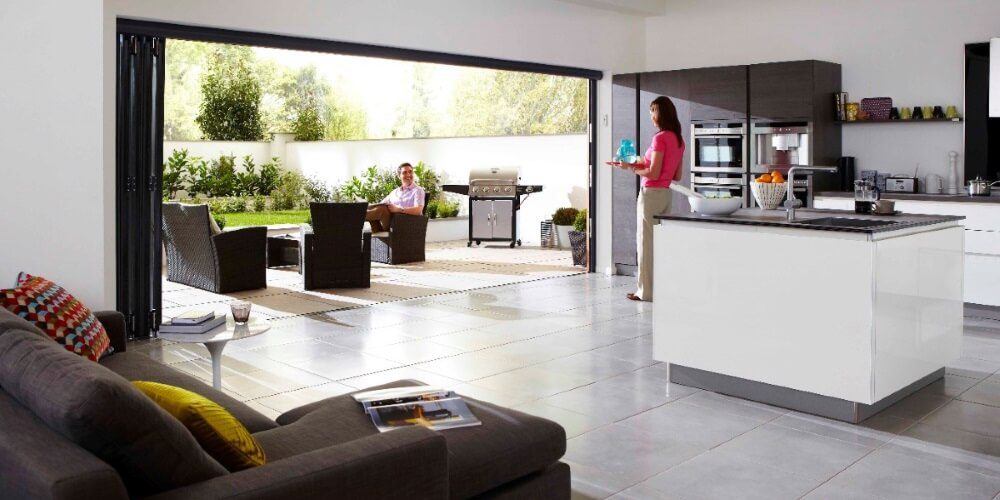In the realm of contemporary interior design, the choice of doors can significantly influence the overall aesthetics, functionality, and ambiance of a space. Bi-fold doors, with their innovative folding mechanism, have gained popularity as a stylish and space-saving solution. When it comes to the heart of the home—the kitchen—integrating bi-fold doors can be a transformative decision. In this blog post, we’ll delve into the advantages and disadvantages of incorporating bi-fold doors into your kitchen, offering a nuanced perspective to help you make an informed decision.

Advantages of Bi-Fold Doors in the Kitchen:
1. Space Optimization: Maximizing Every Inch
Bi-fold doors, with their folding design, are inherently space-efficient. When opened, they neatly fold against the wall, allowing you to maximize the available kitchen space. This is particularly advantageous in smaller kitchens where every inch counts, offering an unobstructed view and creating a sense of openness.
2. Indoor-Outdoor Connectivity: A Breath of Fresh Air
One of the standout advantages of bi-fold doors is their ability to seamlessly connect indoor and outdoor spaces. By incorporating these doors in your kitchen, you can effortlessly extend your living area to a patio or garden. This not only brings the beauty of the outdoors inside but also floods the kitchen with natural light, creating a bright and welcoming atmosphere.
3. Design Versatility: Tailored Elegance
Bi-fold doors come in a variety of materials, finishes, and configurations. This versatility allows you to tailor the doors to match your kitchen’s specific design aesthetic. Whether you prefer a sleek, modern look or a more traditional style, bi-fold doors can be customized to seamlessly integrate with the overall design theme of your kitchen.
4. Improved Ventilation: A Breath of Fresh Air
Proper ventilation is crucial in a kitchen, and bi-fold doors provide an excellent solution. The full opening capability allows fresh air to circulate freely, reducing cooking odors and promoting a healthier indoor environment. This enhanced ventilation can also contribute to energy efficiency by reducing the reliance on mechanical cooling systems.
5. Flexibility in Use: Adapting to Your Lifestyle
Bi-fold doors offer a level of flexibility that is highly beneficial in dynamic modern lifestyles. They allow you to adapt the kitchen space to your specific needs. Whether you’re hosting a gathering and want an open layout for socializing or require privacy for focused cooking, bi-fold doors provide the adaptability to create the desired atmosphere.
6. Natural Light: Illuminating the Heart of Your Home
Large glass panels in bi-fold doors invite an abundance of natural light into the kitchen. This not only enhances the visual appeal but also reduces the need for artificial lighting during daylight hours. The infusion of natural light creates a brighter and more inviting space, elevating the overall kitchen experience.
7. Ease of Maintenance: User-Friendly Design
Bi-fold doors are designed for ease of use and maintenance. The folding mechanism is generally smooth and reliable, ensuring effortless operation. Additionally, the use of durable materials simplifies cleaning, making it a practical choice for busy kitchens where convenience is paramount.
8. Customization Options: Personalizing Your Space
With a wide range of customization options, bi-fold doors empower you to personalize your kitchen space. Choose from different frame materials, finishes, and glass types to create doors that align with your unique style preferences. This customization adds a touch of individuality to your kitchen design.

Disadvantages of Bi-Fold Doors in the Kitchen:
1. Cost Considerations: A Higher Initial Investment
While the benefits of bi-fold doors are abundant, they often come with a higher initial cost compared to traditional doors. The quality of materials, the complexity of the folding mechanism, and customization options can contribute to an elevated price point. Homeowners should carefully weigh this cost against the desired features and aesthetics.
2. Limited Privacy: The Transparency Quandary
The use of large glass panels, while excellent for bringing in natural light, can pose challenges in terms of privacy. If your kitchen activities require a degree of seclusion, the transparent nature of bi-fold doors may need to be balanced with the installation of curtains or blinds.
3. Weather Sensitivity: Exposure to the Elements
In regions with extreme weather conditions, the kitchen may be more exposed to temperature fluctuations, humidity, and external elements when the doors are open. Proper insulation and weatherproofing measures may be necessary to mitigate these effects and maintain a comfortable indoor environment.
4. Installation Complexity: Professional Assistance Required
Installing bi-fold doors is more complex than fitting traditional doors. The folding mechanism, track system, and precise alignment require professional expertise. Incorrect installation can lead to operational issues, affecting the smooth functioning of the doors and potentially compromising energy efficiency.
5. Limited Size Options: Space Constraints
The size of the opening may limit the options for bi-fold doors. In larger kitchens, extensive structural modifications may be required to accommodate a bi-fold door system. Homeowners should consider the space available and the desired size of the opening when contemplating bi-fold doors.
6. Maintenance of Glass Panels: Clearing the View
While the glass panels contribute to the aesthetic appeal, they also require regular cleaning to maintain clarity. Fingerprints, smudges, and dust can be more noticeable on glass surfaces, necessitating consistent maintenance to keep the doors looking pristine.
7. Security Concerns: Addressing Vulnerabilities
Bi-fold doors may be perceived as having more vulnerabilities in terms of security due to the extensive use of glass. To address these concerns, it’s crucial to invest in robust locking mechanisms and, if necessary, reinforced glass to ensure the security of your kitchen and home.
8. Noise Transmission: Acoustic Considerations
The large glass panels may not provide the same level of sound insulation as solid doors. In kitchens where noise from cooking and appliances can be prevalent, homeowners should consider acoustic factors and potential noise transmission into adjoining spaces.
In conclusion, the decision to incorporate bi-fold doors into your kitchen involves a careful consideration of the advantages and disadvantages. While they offer unparalleled design flexibility, improved ventilation, and a seamless indoor-outdoor connection, aspects such as cost, privacy, and maintenance should not be overlooked. By weighing these factors based on your lifestyle, preferences, and budget, you can make an informed choice that aligns with the unique needs of your kitchen space.





